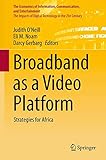Broadband as a Video Platform [electronic resource] : Strategies for Africa / edited by Judith O'Neill, Eli M. Noam, Darcy Gerbarg.
Series: The Economics of Information, Communication, and Entertainment, The Impacts of Digital Technology in the 21st CenturyPublisher: Cham : Springer International Publishing : Imprint: Springer, 2014Description: XVI, 177 p. 83 illus., 72 illus. in color. online resourceContent type:- text
- computer
- online resource
- 9783319036175
- 658 23
- HD28-70
 eBooks
eBooks
Preface -- Foreword -- 1 Introduction -- 2 Media Entertainment as Development Strategy -- 3 Let Them Eat Movies: (How) Will Next Generation Broadband Diffuse Through Africa? -- 4 The State of Broadband in Africa: What's here and What's coming? -- 5 The Cost of Deploying a Successful Video Broadband Business in Africa and the Cost of Not Deploying -- 6 Implications of Broadband Video on National and International Media Systems -- 7 What to Expect from Platforms and Applications -- 8 Technology Trends on Connect Africa -- 9 The Impact of Policy on the Performance of the ICT Sector -- 10 Information Technologies for Rural Development in Africa -- 11 The Economic Impact of Telecommunications in Senegal -- 12 Africa Leapfrogs into the World Economy.
This volume features contributions from a conference held in Lusaka, Zambia, to explore the role and prospects of broadband in Africa as a video platform—with emphasis on the strategies and building blocks for deployment and advancement. While it may seem that such networks and their applications are not a realistic scenario for developing countries, it would be short-sighted and economically dangerous to ignore the emerging trends. The pace of introduction of next-generation networks in industrialized countries is rapid and the developing world will not be able to stand aside. The risks of falling behind are great and in any country there will be elements of business and society who wish to forge ahead. Policymakers and network architects need to be prepared. Media companies and broadcasters, in particular, must be alert to the new developments, as should be medical and educational institutions. The availability of advanced high-speed business application tools in a country will affect its participation in international transactions and its economic growth. This volume features contributions from industry leaders, policymakers and scholars, representing a variety of perspectives, including technology and infrastructure management, economic development, marketing, education and health. The authors collectively discuss how broadband deployment as a platform with sufficient speed for video may be encouraged by public policy and regulation and how investment in broadband for this and related purposes can improve the quality of life and experience in Sub Saharan Africa in media and data, while being a financeable, commercially sound business.


